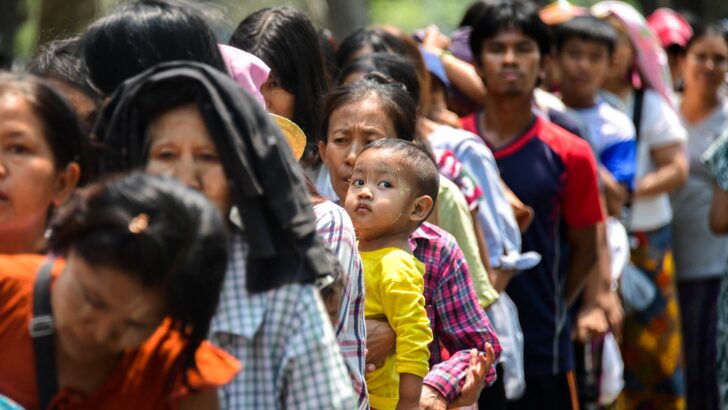In parts of the devastated earthquake regions of Myanmar, ongoing attacks by the military are hampering the deployment of aid workers. The military government rejects a temporary ceasefire in the civil war country. According to local media (Wednesday), junta leader Min Aung Hlaing emphasised that the “necessary defence operations” would continue. Myanmar’s democratic underground government had announced a unilateral ceasefire in the regions affected by the severe earthquake on Sunday.
Meanwhile, the death toll after the quake rose to more than 2,700, according to the junta. More than 4,500 people were injured and around 400 people are missing.
Fire on Red Cross convoy
Troops of the military junta had opened fire on a Chinese Red Cross aid convoy on Tuesday. The convoy was travelling to support victims of the earthquake in the Sagaing and Mandalay regions. The convoy had no authorisation from the authorities, said a junta spokesman.
The programme manager of Diakonie Katastrophenhilfe, Michael Frischmuth, called for the work of aid workers not to be jeopardised by fighting. Reports from the ground are frightening. “Many people are desperate and no extensive aid has yet reached them,” said Frischmuth. High temperatures and a lack of drinking water are threatening “disaster after disaster”.
Heat and lack of drinking water exacerbate the situation
The teams from the aid organisation Care also reported a dramatic situation. Rescue teams are still searching for buried victims, while hospitals are already completely overloaded. Many people are without water, food and protection from the heat. In addition, there is growing concern about a possible cyclone at the beginning of April, which could exacerbate the situation.
Médecins Sans Frontières emergency teams pointed to a destroyed infrastructure. The power supply is severely restricted and people urgently need clean water and latrines. The conflict, communication failures and access restrictions made it difficult to determine the full extent of the damage and medical needs. Little is also known about the situation in remote areas.
Meanwhile, the Catholic aid organisation missio Aachen has made around 144,000 euros available to its church partners in Myanmar. The missio partners used the money to distribute water, food, hygiene articles, mosquito nets and medicines, it said. There were also offers of initial psychological help.
Children suffer the most from the consequences
The aid organisations World Vision and Save the Children drew attention to the particularly difficult situation of children. Even before the disaster, the situation was dramatic for many families. “Now the destruction has exacerbated the suffering of families and put children in great danger. In emergency situations like this, some children are forced to flee, are separated from their families and are exposed to exploitation and abuse,” said Country Director Kyi Minn. Girls are particularly at risk.
Save the Children emphasised that children without a roof over their heads are particularly vulnerable to the effects of the heat. They are at risk of dehydration, exhaustion and heat stroke. They are also at increased risk of respiratory and kidney diseases. Even before the earthquake, 6.3 million children were already dependent on humanitarian aid, and this figure is now rising.
Meanwhile, “Aktion Deutschland Hilft” announced that around three million euros had been donated for emergency aid. At the same time, it is becoming increasingly clear that the need for aid is huge. There is a lack of drinking water and medical supplies as well as tents and mosquito nets. Rapid aid is urgently needed to prevent epidemics.
Credit: Inga Kilian (KNA)


 Displaced people wait in line for food and relief supplies in Mandalay, Myanmar, April 3, 2025, following a 7.7 magnitude earthquake that hit midday March 28. As the death toll following the massive earthquake is expected to reach at least 3,000, humanitarian organizations in the region, like Catholic Relief Services, are working round the clock to get essential supplies to those in need. (OSV News photo/Reuters)
Displaced people wait in line for food and relief supplies in Mandalay, Myanmar, April 3, 2025, following a 7.7 magnitude earthquake that hit midday March 28. As the death toll following the massive earthquake is expected to reach at least 3,000, humanitarian organizations in the region, like Catholic Relief Services, are working round the clock to get essential supplies to those in need. (OSV News photo/Reuters) 